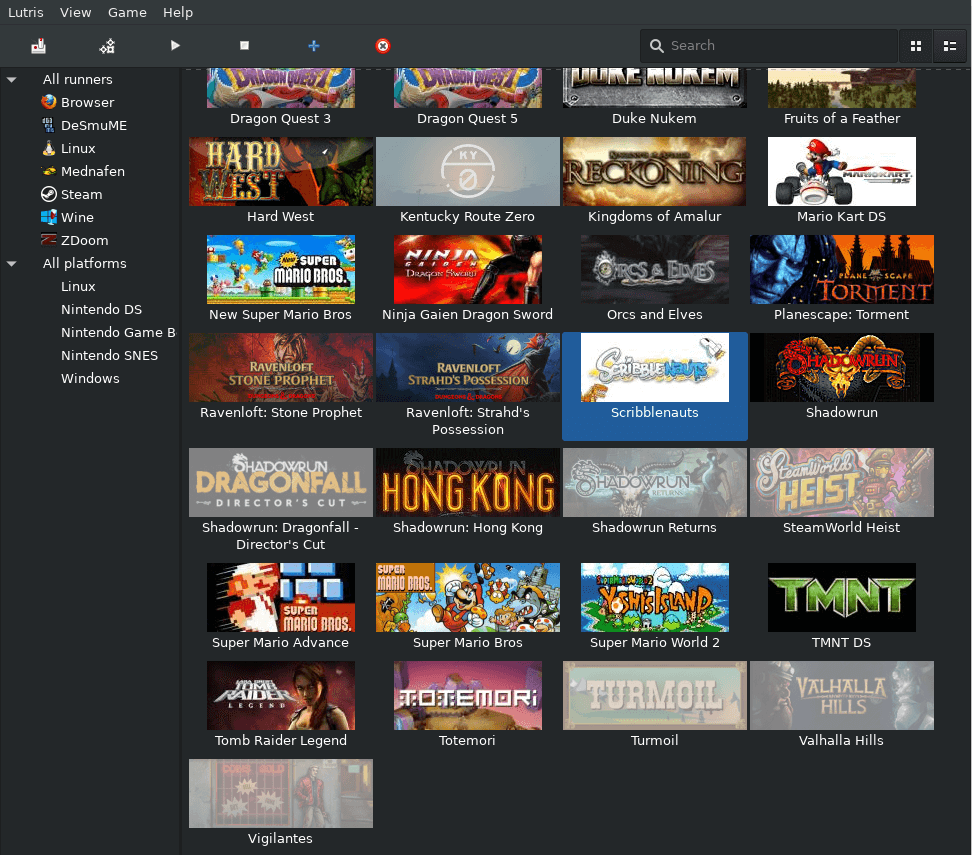Linux gaming gets more awesome by the day and Lutris is another title that supports my assertion.
Lutris is an open source Linux gaming platform with support for different game platform titles including native Linux Games, Gamecube, Windows, and PlayStation.
Lutris helps you install, configure, manage, and launch games (using programs referred to as “runners“) from a single interface. All runners, except those of web browsers and Steam, belong to and are managed by Lutris.
It is easy to navigate Lutris app window with all the runners listed in a tree view on the left. You don’t even need to remember where your installed games are – browse to find them or type a name in the search field and you’ll be good to go.

Features in Lutris
- Open source with source code available on GitHub.
- Free to use.
- Available for any Linux platform.
- Add, configure, and play libre games.
- Supports command line options.
- Supports 20+ emulators with automatic one-click install.
- Play Steam games.
- Supports Arcade machines, Amiga computers, Flash and HTML5 games, Sony, MS-DOS, etc.
Lutris supports a lot more gaming platforms and has more features coming to it in the near future.
It doesn’t sell games so you will need to have bought commercial games in order to install them. For other games, Lutris features community-provided scripts that give you access to a game library where you can play games without the need for a manual setup.
Are there any games you want to play? Search for them and add them to your collection. Lutris will help you through any signup or import processes necessary. If you had games before installing Lutris, importing them is a breeze – truly awesome.
Installation of Lutris in Linux Desktops
Lutris is compatible with all modern Linux distributions, it depends on the Python and Gnome 3 libraries (but will run smooth under any desktop environment).
To install Lutris, run the following commands on your respective Linux distributions.
On Ubuntu and Derivatives
$ ver=$(lsb_release -sr); if [ $ver != "18.10" -a $ver != "18.04" -a $ver != "16.04" ]; then ver=18.04; fi $ echo "deb http://download.opensuse.org/repositories/home:/strycore/xUbuntu_$ver/ ./" | sudo tee /etc/apt/sources.list.d/lutris.list $ wget -q https://download.opensuse.org/repositories/home:/strycore/xUbuntu_$ver/Release.key -O- | sudo apt-key add - $ sudo apt-get update $ sudo apt-get install lutris
On Debian
$ echo "deb http://download.opensuse.org/repositories/home:/strycore/Debian_9.0/ ./" | sudo tee /etc/apt/sources.list.d/lutris.list $ wget -q https://download.opensuse.org/repositories/home:/strycore/Debian_9.0/Release.key -O- | sudo apt-key add - $ sudo apt-get update $ sudo apt-get install lutris
On Fedora
$ sudo dnf install lutris
For other Linux distributions, follow the installation instructions at the download page below.
[mks_button size=”medium” title=”Download Litrus for Linux” style=”squared” url=”https://lutris.net/downloads/” target=”_blank” bg_color=”#529b30″ txt_color=”#FFFFFF” icon=”fa-download” icon_type=”fa” nofollow=”1″]
Have you checked Lutris out yet? It is free, open source, and awesome. Your comments and suggestions are always welcome in the comments section below.
